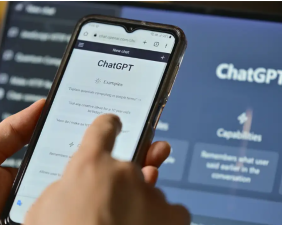AI language models like ChatGPT have become widely popular, promising to revolutionize every aspect of our lives. It certainly delivers on its promise. But… while these technologies undoubtedly provide convenience and efficiency, many are also increasingly concerned about their impact on human creativity and critical thinking skills. While generative AI tools like ChatGPT offer convenience, they do pose a risk of undermining critical thinking. However, this impact is not absolute and depends on the method, frequency, and accompanying educational guidance.

Limit dependency:
Use AI tools like ChatGPT as an aid, not as the sole source of information and ideas. Balance AI-generated responses with independent research and critical analysis.
Engage in diverse experiences:
Actively seek out new experiences, engage in creative hobbies, and explore different perspectives to stimulate imagination and critical thinking.
Promote relationships:
Engage in meaningful conversations and debates with others to challenge ideas, expand knowledge, and strengthen critical thinking skills.
Encourage open-mindedness:
Embrace a mindset that welcomes different perspectives and encourages independent thinking. Avoid over-reliance on ChatGPT responses as the final word.
Emphasize active learning:
Actively engage in hands-on learning experiences that require critical thinking, problem solving, and creativity. This can include projects, experiments, and real-world applications of knowledge.
The Reasons for ChatGPT's Success
ChatGPT has quickly attracted a large number of users in a short period of time and demonstrated its ability to write emails, computer codes, academic papers and even poems. This technology has not only passed multiple tests, but is also considered to have a disruptive impact on the field of higher education. However, attitudes towards ChatGPT vary greatly around the world. For example, the New York City Department of Education has banned the use of ChatGPT on its public school devices and networks, fearing that it may lead to more students cheating. Meanwhile, Andreas Schleicher, director of educational skills at the Organization for Economic Cooperation and Development, welcomed ChatGPT because it gives people the opportunity to focus on things other than tasks that technology can also do well. A survey conducted by http://Study.com showed that more than a third (34%) of educators believe that ChatGPT should be banned in schools and universities, while the rest (66%) support students using it to complete homework or other tasks. More than 89% of students said they had sought help from ChatGPT to complete homework or other tasks.
The ability of artificial intelligence to accumulate knowledge quickly will enable it to perform better in performing routine tasks undertaken by graduate students and scholars, such as literature reviews, programming and normative scientific writing. Scholars around the world are discussing whether and to what extent artificial intelligence should participate in or contribute to scientific articles. Just as most technological advances and breakthrough innovations in history have played a role, artificial intelligence should and will be a powerful tool to promote the development of higher education around the world. However, ChatGPT and other large language models also have the problem of "illusion", that is, they sometimes generate inaccurate or misleading information. Therefore, when using such tools, it is necessary to be cautious about the information provided and verify it through reliable sources.
Seeing the above application and actual data of ChatGPT, it is not difficult to find that such LLM model tools can replace humans to complete more repetitive work, allowing humans to do more creative work, and can also quickly improve people's cognitive ability, but there will also be some shortcomings, just like the existing new technology development route. If we want such tools to play a positive role, we must continue to accumulate our basic knowledge and ability level, so that we can use the tools reasonably. If we do not have basic knowledge and thinking ability, then such tools do not know what you want. Tools are used to play a role in our social development, not to replace them. Therefore, because of the emergence of such AI tools, I believe that it will not only not weaken the thinking ability of the overall social public, but will continue to improve. Because, in the future, people who can master the rational use of such tools and create value will be able to receive more material rewards or returns, which will continue to stimulate human thinking ability and creativity from this perspective.
